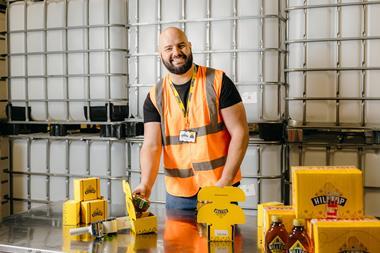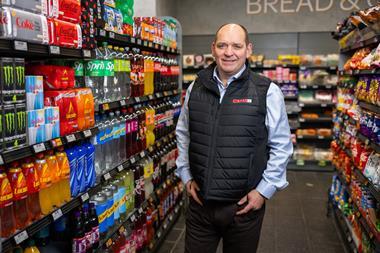His MoneySavingExpert website gets 80 million hits a month. Last month he came top in our Power 100 list. Martin Lewis talks to Simon Creasey about supermarkets, furthering consumer empowerment… and a possible role in Whitehall
Martin Lewis arrives, hot and late, after a whirlwind week of TV appearances and trips to the dentist, and hurriedly hands the helmet for his scooter to his PA.
There is no time to jest about the price certain retailers might pay to wield the dentist’s drill. I have half an hour. And it’s hard to imagine, from his intense, driven demeanour, that Lewis was once a standup comedian.
Not now. With 10 million disciples to his MoneySavingExpert website, he has achieved a “biblical” status as a consumer champion, Tesco UK CEO Richard Brasher acknowledged. And his site is estimated by industry sources to be worth £100m or more, should he choose to sell. But he won’t.
Not now, not yet. While he admits he can’t see himself doing the same thing in 10 years’ time, he has a lot of unfinished business to attend to, including the retailers. “I still think the retailer’s profitability structure, organisation and store layout, overpowers the desire to treat the consumer fairly,” says Lewis.
Last month, The Grocer controversially chose Lewis as the most powerful force in grocery retail. His initial response was of bemusement.
“At first I thought it was bonkers,” he says. But while he baulks at the idea that he represents the consumer “I certainly do not: an MP represents a consumer far better than I do. I think we have a voice, an understanding and an ability to corral consumers, but I don’t represent them” he acknowledges that with the “massification of consumer power” the balance is much more even.
“The internet has been a seismic shift of the past 10 years and has empowered consumers,” explains Lewis. “What the recession did was to heighten price sensitivity, heighten the world of vouchers, discounts and internet marketing, and brought about a cultural shift in attitudes towards saving money and made cheap chic,” he adds.
This new, thrift-conscious, playing field made it easier for Lewis to recruit followers and in turn has made life more difficult for retailers.
“In the old days the retailer attitude was ‘we’re going to run this offer there is a way around it but only a couple of people will manipulate the offer so let’s not worry’. However, consumers can figure out the manipulated offer within five minutes. We put it on our email and you’ve suddenly got a mass of people swamping a company with complaints, or taking advantage of lax terms and conditions on promotional deals.”
The most recent example of consumer empowerment came in April when Tesco was forced to abort its Double the Difference campaign after web developer David Whitehouse built his now infamous arbitrage website, Trolleychecker.com, from his spare room, in a matter of hours. Although Whitehouse beat MSE to the punch “we were going to do our own thing but then Tesco pulled the plug” it was MoneySavingExpert.com that raised awareness of the loophole among the site’s legion of followers, inspiring Whitehouse to build his site; and MSE also promoted Trolleychecker when it went live.
Lewis has mixed emotions about Tesco’s handling of the affair. He says the retailer’s initial response to cut the promotion down was handled very badly and “left a sour taste”. But this was replaced by a feeling of “schadenfreude” for showing the marketing up for what it was an empty promise. “I have a problem with price promises,” he explains.
“I believe they just give one retailer the security that in the worst-case scenario it will have to drop its margins to the same as its competitors.
“In this price promise they went beyond that but they were well aware that most people would not check. A real price promise would have been to say ‘if our products are available cheaper in Asda and you report it to us, we will drop it to the same price as Asda’. That’s a real price promise.”
Lewis is at pains to point out he’s not anti-profit - he’s “anti consumers getting screwed”. And retailers are not the worst offenders in this regard, he stresses. “They’re certainly not the biggest b*****ds out there. They don’t come close to some of the utility companies and banks in the way they operate, and I think the consumers have that perspective of them as well.”
Indeed, he admits to admiring the way supermarkets operate. “They are the most honed and beautiful marketing environments. From a purely academic perspective you have to admire the finesse and the way they sell products. The genius of the supermarkets is the way they are able to take a customer who walks through the door and completely change what they want to buy. If I could try and understand that and work it the other way around, I think we would be a hell of a lot better at our job.”
Man U or Man City?
He also says he doesn’t have a particular axe to grind with Tesco, claiming that over the past decade its pricing policy has been “mostly pro-consumer”. He just wants the playing field levelled.
“I’m a Man City fan and when we play Man U I desperately don’t want them to score but I don’t think they’re wrong for trying. I believe it’s the same adversarial relationship between consumers and the supermarkets.
“I desperately want consumers to win and get the best deals but I don’t blame the supermarkets for trying as long as they play within the rules.”
This is where Lewis’ campaign for compulsory financial education in schools comes into play. He believes that people should be trained as consumers from an early age and is involved in an all-party parliamentary group lobbying for this to be pushed through.
Lewis admits he has political ambition, “with a small p”, but dismisses suggestions that he might one day run for parliament.
“I don’t want to be an MP,” he says, “but I would like to do more work around financial education, mental health and debt and consumer empowerment campaigning, in a more political sphere rather than on television and through the website.”
Might he consider taking on a more formal role within Whitehall, à la Mary Portas, perhaps as a consumer representative or financial education tsar?
“Watch this space,” he responds. “As long as I am free to say what I want to say and as long as I think it would do some good and I wouldn’t just be there as an apologist for a system then I would be happy to engage in that, but my problem is I just don’t have that much time.”
So what’s occupying Lewis’ time? Apart from writing his blog, his newspaper columns, television and radio appearances and improving his Scrabble score (see boxout). Lewis is about to unleash his army of followers on another sector. He offers no clues other than that it’s not retail, but he says he has identified a major loophole and developed a tool to help consumers exploit it.
Business leaders from this industry have already promised him they will close the loophole if he carries through with his threat. It’s a conundrum he expects to face more frequently in the future.
“If we come up with more clever ways to shop I have no doubt they will either be closed down or there will be even more clever ways brought up to make us spend more money. In the old days, whether it was shops, banks or utilities, they came up with clever ways to screw people out of money.
“What I love about the internet era is that now, when they come out with clever ways to screw people out of money, they do it for a short while and then it gets closed down by consumers.”
Martin Lewis snapshot
Age: 39
Marital status: married to Mrs MSE, aka former TV weather presenter Lara Lewington
Education: studied government and law at London School of Economics
Employment history: after a brief spell in PR at Brunswick, Lewis moved into business journalism at the BBC. He first provided consumer finance advice on the now defunct satellite TV channel Simply Money in 1999. During the course of his research he would email money-saving tips to friends. Noticing strangers thanking him at parties, he realised the tips were achieving a viral fanbase and quickly built up a list of 1,000 emails to promote his work. He then paid a web developer in Uzbekistan £100 to launch a more professional site and, in 2003, MoneySavingExpert.com was born.
MoneySavingExpert statistics: the website has 8.9 million users and there are more than six million subscribers to its weekly email. Revenue is generated through affiliate links on the website. It accepts no advertising.
Does he have time for hobbies? Yes. He’s finally achieved his long-held goal of averaging a score of 400 in Scrabble. He also plays golf badly, reads historical novels, likes jive, and is an athletics stats nerd.




















No comments yet